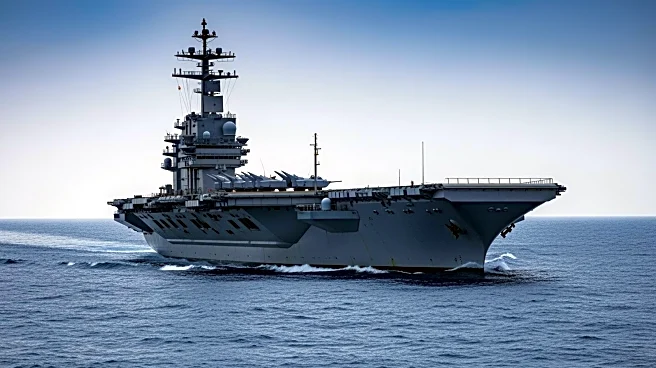What's Happening?
China has launched its most advanced aircraft carrier, the Fujian, marking a significant milestone in its naval expansion. The Fujian, equipped with electromagnetic catapults, allows aircraft to be launched at higher speeds, enhancing operational capabilities.
This development comes after a grand commissioning ceremony led by Chinese leader Xi Jinping. The Fujian is China's third aircraft carrier and contributes to the country's status as having the world's largest navy by number of ships. Under Xi's leadership, China has rapidly expanded its naval forces, increasing pressure on the United States and its allies to respond to this growing military capability.
Why It's Important?
The launch of the Fujian represents a strategic shift in naval power dynamics, particularly in the Asia-Pacific region. China's naval expansion poses a challenge to U.S. military influence and its ability to project power in the region. The advanced capabilities of the Fujian, such as its electromagnetic catapults, signify a technological leap that could alter naval engagements. This development may prompt the U.S. and its allies to reassess their naval strategies and increase their military presence in the region to counterbalance China's growing influence. The expansion of China's navy could also impact global trade routes and security, given the strategic importance of maritime navigation.
What's Next?
The United States and its allies are likely to monitor China's naval advancements closely, potentially leading to increased military spending and strategic deployments in the Asia-Pacific region. Diplomatic efforts may intensify to address the balance of power and ensure regional stability. The U.S. might also seek to strengthen alliances with countries in the region, such as Japan and South Korea, to counter China's growing military capabilities. Additionally, international discussions on arms control and naval treaties could gain momentum as countries seek to manage the implications of China's expanding naval power.
Beyond the Headlines
China's naval expansion reflects broader geopolitical ambitions and a desire to assert its influence on the global stage. The development of advanced military technology, such as the Fujian's electromagnetic catapults, highlights China's commitment to modernizing its armed forces. This could lead to increased tensions in international waters, particularly in contested areas like the South China Sea. The expansion also raises questions about the future of international maritime law and the potential for conflicts over territorial claims. As China continues to invest in its military capabilities, the global community may need to address the ethical and legal implications of such advancements.















